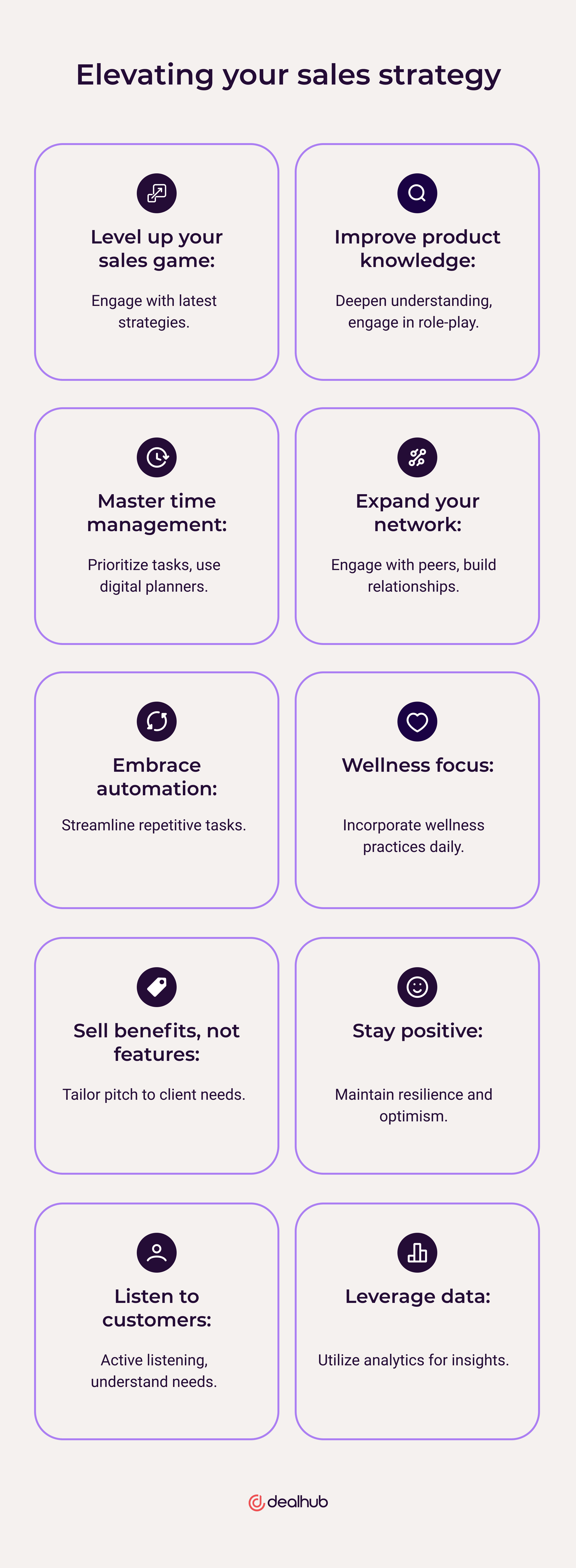10 New Year’s resolutions for sales professionals

1. Level up your sales game
To continuously evolve in sales, immerse yourself in both traditional and modern sales techniques. This involves regular engagement with the latest industry strategies and tools. Set aside an hour each week to read current sales articles, listen to podcasts, and attend webinars. Participating in sales mentorship programs or joining professional sales communities can offer further insights, allowing you to stay ahead in a competitive market. This continuous learning approach keeps your skills sharp and opens up new perspectives in handling diverse sales scenarios.
2. Improve your product knowledge
Enhancing your product knowledge goes beyond understanding basic features; it’s about comprehending what sets your product apart in the market. Schedule monthly meetings with your product team to keep updated on new developments and innovations. To further deepen your understanding, engage in role-playing exercises that simulate various sales situations, allowing you to effectively communicate the value of your product. This deep product insight helps build credibility with clients and tailor your pitch to meet their specific needs.
3. Master time management
Effective time management is crucial in sales. It’s about prioritizing tasks that directly contribute to your sales goals and organizing your day for maximum productivity. Utilize digital planners or apps to schedule and track tasks based on urgency and importance. Batching similar tasks together, such as dedicating specific blocks of time to client outreach or administrative duties, can help reduce distractions and enhance focus. Mastering this skill ensures that you’re spending time on activities that have the highest impact on your sales targets.
4. Expand your network
Networking is critical to building a successful sales career. It involves not just making connections but nurturing long-term professional relationships. Dedicate time each week to engage with industry peers and potential clients, both online and in person. Staying visible and active in your professional community, including sharing industry insights and personal experiences on professional platforms like LinkedIn, can lead to new opportunities and valuable collaborations. Regular networking helps you stay informed about industry trends and opens doors to new business prospects.
5. Embrace automation
Automating repetitive tasks in your sales process can significantly increase your efficiency, freeing up time for more strategic activities. Identify tasks that can be automated, such as data entry or scheduling follow-ups, and implement suitable automation tools. Automation streamlines your workflow and reduces the risk of errors or data omissions, allowing you to focus on building stronger client relationships and closing deals.
6. Schedule time for wellness
Prioritizing your physical and mental health is essential for optimal sales performance. Integrating wellness practices into your daily routine, like daily walks, meditation, or mindfulness exercises, can significantly enhance your focus, energy levels, and decision-making abilities. These practices help maintain a balanced approach to work, reduce stress, and improve overall job satisfaction. Consistently practicing wellness benefits your personal health and positively impacts your professional life, leading to better sales outcomes.
7. Sell benefits, not features
In sales, focusing on how your product benefits the client is more impactful than merely listing features. Understand the client’s perspective and tailor your pitch to address their specific needs and challenges. For each product feature, identify a corresponding benefit that meets the client’s requirements. Utilizing customer testimonials highlighting these benefits can also be an effective strategy in your sales dialogues. This approach leads to more meaningful client conversations and helps build more robust, trust-based relationships.
8. Stay positive
Maintaining a positive and resilient attitude is crucial in navigating the ups and downs of the sales profession. This mindset helps in staying motivated and overcoming challenges. Start each day with positive affirmations and reflect on your successes at the end of the day to maintain this positive outlook. Joining peer groups for regular motivation and sharing best practices can also be beneficial. A positive attitude improves your mental well-being and positively influences your interactions with clients and colleagues.
9. Listen to customers
Every salesperson deals with sales objections. Active listening is vital to understanding and effectively responding to customer needs. It involves fully concentrating, understanding, responding, and then remembering what the customer says. In every customer interaction, focus on actively listening, ensuring you comprehend their needs and preferences. Practice summarizing key points back to the customer to confirm your understanding. This skill reveals more profound insights into customer needs, leading to more personalized service and higher customer satisfaction and retention.
10. Leverage data
Utilizing data analytics is crucial in sales. Regularly review customer interaction data and metrics to gain sales insights that can refine your strategy. Understanding customer behavior, preferences, and trends allows you to tailor your approach for maximum impact. Investing time in learning advanced data analysis techniques can provide an edge, enabling you to uncover patterns and opportunities that might otherwise go unnoticed. Data-driven strategies lead to more informed decisions and can significantly enhance sales performance.
From intention to action
The journey from setting resolutions to implementing them in the sales realm is a nuanced process, involving a deep understanding of habit formation, strategic goal setting, and a steadfast commitment to action.
The psychology of habit formation in sales
Habit formation in sales is a complex psychological process where consistent behavior becomes automatic. This transformation is rooted in the brain’s ability to form and strengthen neural pathways with repetition. For example, a sales professional who habitually reviews client feedback every morning reinforces neural pathways associated with client-centric thinking. Understanding these mechanisms can empower salespeople to develop habits that enhance their effectiveness. Successful salespeople often attribute their achievements to such ingrained habits, like consistently networking or staying updated on market trends, which eventually become second nature and significantly impact their career trajectory.
Developing and sticking to new habits
Forming new habits requires identifying specific cues and establishing routines around them. For instance, a morning alarm can be a cue for a salesperson to spend the first hour of the day prospecting. Consistency in responding to these cues is crucial; the repetition embeds the habit. Setting up a personal reward system, such as a short break after a successful client call, can further reinforce these behaviors.
Overcoming common challenges
As sales professionals, we often encounter challenges like fluctuating motivation and managing a crowded schedule. Overcoming these requires strategies such as dividing large goals into smaller, actionable tasks. For instance, rather than aiming to ‘increase sales by 20%’, break the goal into weekly targets. Using digital tools for reminders and time management can also help you stay on track. Furthermore, facing challenges like forgetfulness can be mitigated by leveraging CRM tools that keep track of client interactions and follow-up tasks, ensuring nothing slips through the cracks.
Effective goal-setting and implementation
Setting practical goals using the SMART framework is a cornerstone of sales success. For example, a goal to ‘enhance networking skills’ could be made SMART by aiming to ‘attend two industry networking events per month to meet at least ten potential clients’. This goal is specific, measurable (two events, ten contacts), achievable, relevant to sales success, and time-bound (monthly). Regularly reviewing these goals, perhaps on a bi-weekly basis, and adjusting them based on progress and feedback is critical to ensuring they remain aligned with your broader objectives.
Celebrating success and ingraining new practices
Recognizing and celebrating small victories plays a significant role in maintaining motivation and building momentum. This could be as simple as acknowledging the achievement of a weekly goal or closing a challenging sale. Celebrations act as positive reinforcement, encouraging you to continue your efforts. The journey from setting resolutions to making them an integral part of one’s routine demands patience and flexibility. Be prepared to adapt your strategies as you gain more insights into what works best for you, thereby transforming resolutions from mere intentions into core components of your sales strategy.
The journey from setting resolutions to seeing them manifest in your sales performance involves a deep understanding of habit formation, strategic goal setting, and a commitment to consistent action and adaptation. By following these steps and celebrating each win, you can transform your resolutions into habits that drive your sales success throughout the year.
Wishing you a happy new year!
As we step into the new year, let’s view these resolutions not just as annual goals but as catalysts for long-term career development. These resolutions are more than mere targets; they are foundational steps toward building a successful and enduring career in sales. The commitment to self-improvement and striving for excellence is what sets apart the top performers in our field. By continuously refining our skills and adapting our strategies, we are well-equipped to turn challenges into triumphs.
Here’s to a year of remarkable achievements and growth. Wishing everyone a prosperous and fulfilling new year! Let’s turn these resolutions into realities and collectively celebrate our milestones throughout the year. Happy New Year!









